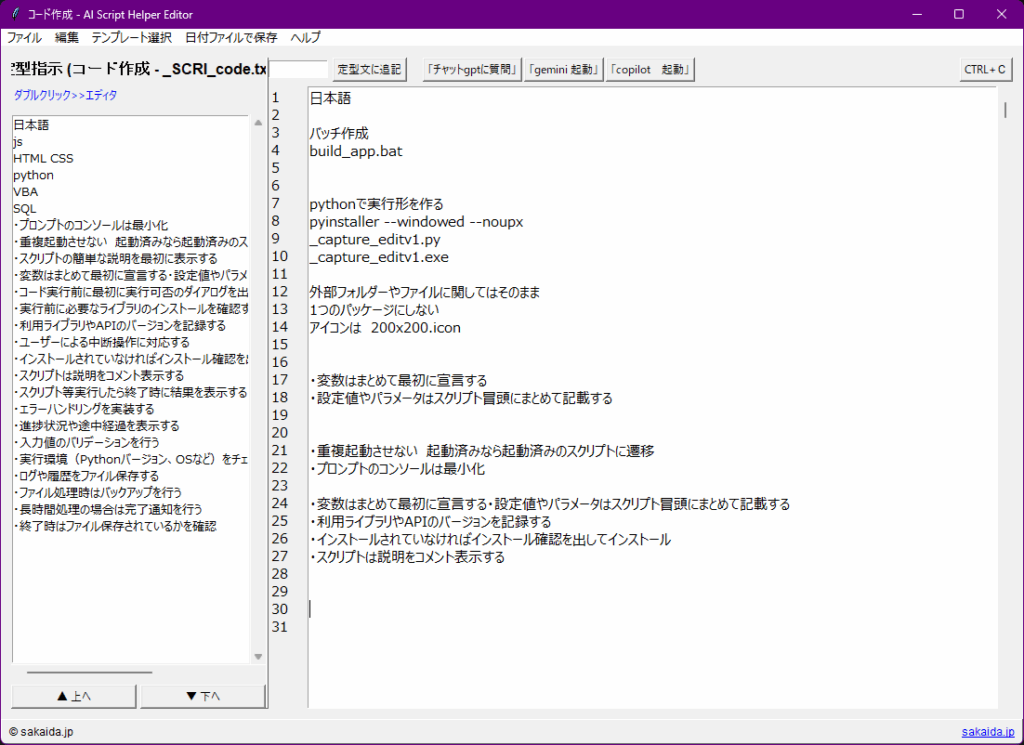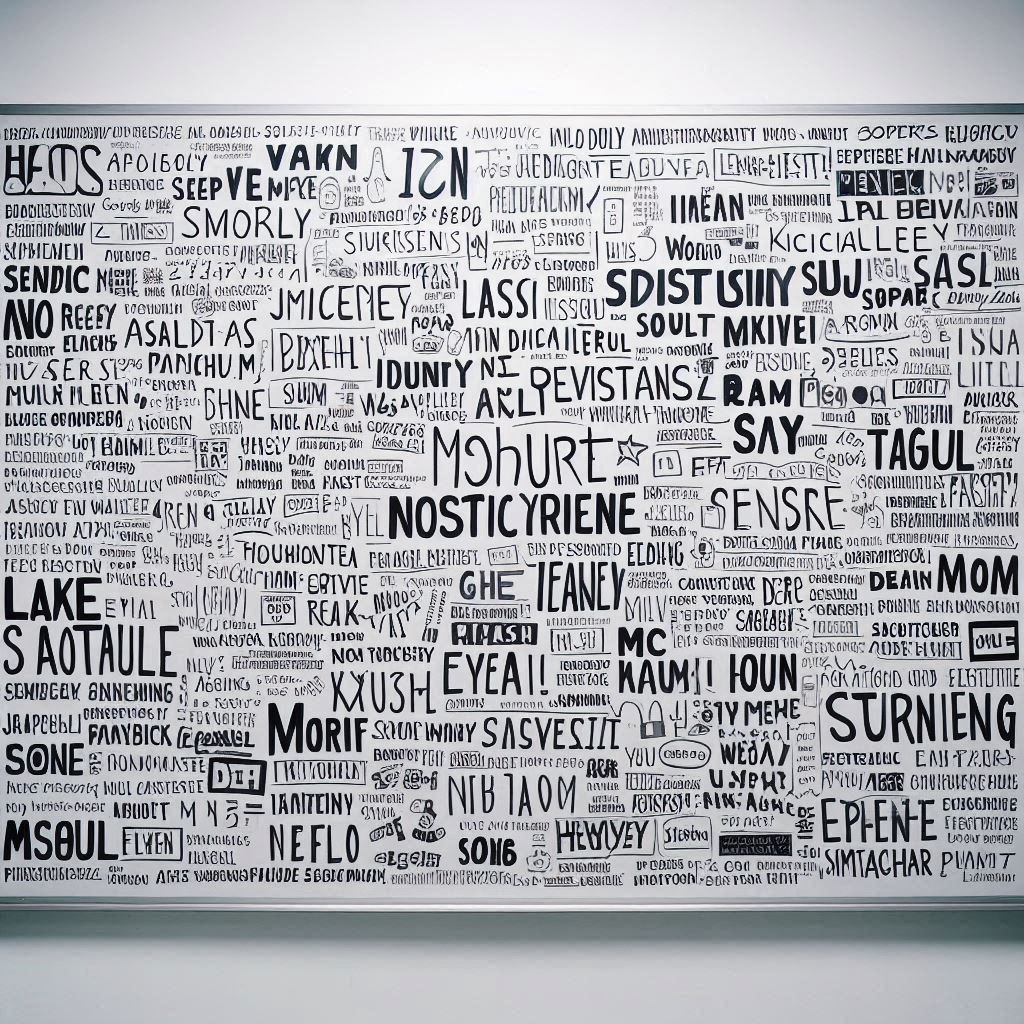AI スクリプトエディター

AIスクリプトヘルプエディターって、どんなもの?

AIスクリプトヘルプエディターは、一言でいうと**「AIに指示を出すのが、もっとラクに、もっと楽しくなるツール」**です!
普段、AIに何かお願いするときって、文章を考えたり、何度も同じことを入力したり、ちょっと手間だと感じたことはありませんか? このエディターは、そんな「めんどくさい」を解消して、あなたがAIともっとスムーズにスクリプト作成できるようにサポートしてくれます。
AIって、私たちの指示次第でいろんなすごいことをしてくれますよね。でも、「どう指示したら一番いいの?」って、結構悩みがちだったりします。このエディターは、そんなあなたの「もっとこうだったらいいのに!」に応えるために生まれました。
- 「また同じこと書くの?」をなくす!: AIに「こういう感じで書いてね」とか「この形式で出力してね」って、繰り返し伝えることってありますよね。そういうよく使うフレーズを、このエディターが覚えてくれるんです。もう何度も入力する手間はいりません。
- AIとの会話をスムーズに!: もしあなたがチームでAIを使っているなら、「あの人、どんな指示出してるんだろう?」って思ったことありませんか?このエディターがあれば、みんなで使える「指示の型」(テンプレート)を作れるので、AIからの返事も安定して、もっと効率的に作業を進められますよ。
- あなたの時間を大切に!: 毎回イチから文章を考えるのって、実はすごく時間を使ってるんです。このエディターが代わりに「型」を用意してくれるので、あなたは本当に伝えたいことに集中できます。その分、他の大事な作業に時間を使えるようになりますよ。
つまり、このエディターは、あなたがAIとの「お仕事」をもっと快適に、そしてスマートに進めるための頼れる相棒なんです!
1. Windows実行版
- メリット: Python不要で即利用可、ローカルファイル連携が強力。
- デメリット: Windows専用、更新時に再ダウンロードが必要。
v7.01: 「設定」メニューに「テンプレフォルダを開く」を追加。
v7.22: カテゴリ選択をボタンで実装
2. WEB版
デメリット: ローカルファイル操作に制限あり、インターネット接続が必須。
メリット: インストール不要でどこからでもアクセス可、常に最新版が利用できる。
ブラウザ版 ブラウザで表示
簡易に利用できるがブラウザのキャッシュクリアをする前に保存する必要がある
ブラウザ版 解説
ブラウザ版(HTML/CSS/JavaScript):
設定(例: 最後に使ったテンプレート、Webリンクのリスト)は、ブラウザのLocal Storageなどの機能を使ってブラウザ内に一時的に保存することは可能ですが、ユーザーがブラウザのキャッシュをクリアすると消えてしまいます。settings.ini のような外部ファイルを読み書きすることはできません。
動作環境: Webブラウザ上で動作します。インターネット接続があれば、どのOSのどのデバイスからでもアクセス可能です(ブラウザの互換性に依存)。
ファイルアクセス: セキュリティ上の制約により、ローカルPCのファイルシステムへの直接アクセスは非常に限定的です。
テンプレートや定型文は、アプリケーションをホストしているサーバーから読み込むか、JavaScript内で直接定義されている必要があります。
編集した内容は、ユーザーが「ファイルに保存」ボタンをクリックすることで、ブラウザのダウンロード機能を通じて手動でダウンロードさせる形になります。直接指定のフォルダに自動保存することはできません。
これで、AIプロンプト作成がよりスムーズになりますよ!
どんな風に使うの?
使い方はとってもシンプル!主に3つの機能が、あなたのAI活用をサポートしてくれます。
1. テンプレートでサッとスタート!
AIに何かお願いするときって、「文章作ってほしいな」「画像生成してほしいな」「この書類、校正してほしいな」みたいに、目的が決まっていることが多いですよね。このエディターには、そんな目的ごとにあらかじめ「型」が用意されています。
メニューから「コード作成」とか「文書校正」とか、やりたいことに合ったテンプレートを選ぶだけで、エディターに基本的な指示のひな形がパッと表示されます。これで「何から書こう?」って迷う時間がグッと減りますよ。
しかも、前回使ったテンプレートを覚えてくれるので、次にエディターを開いたときも、すぐに前回の続きから始められます!もちろん、あなただけのオリジナルテンプレートを作ることも可能です。
2. 定型文でポンと追加!
テンプレートを選んだら、次に活躍するのが定型文です。エディターの左側に、そのテンプレートに合わせた「よく使うフレーズ集」が表示されます。
例えば、コード作成のテンプレートなら、「Pythonで書いてね」「エラーハンドリングもお願い」といった、プログラミングでよく使う指示が並んでいるイメージです。使いたいフレーズをダブルクリックするだけで、エディターにサッと追加できます。キーボードを打つ手間が省けて、ストレスフリー!
「この表現、また使うかも!」と思ったら、エディターに書いた文章から、一行を選んで定型文に追加することもできます。どんどん自分だけの便利フレーズ集を育てていけますよ。
3. 日付ファイルで記録を残そう!
AIとのやり取りって、後から見返すと「あの時の指示、よかったな」とか「これは改善しよう」といった発見がありますよね。このエディターでは、あなたが作成した指示やAIからの応答を、分かりやすいファイル名で保存できます。
例えば、「20250704_文書校正.txt」のように、日付と使ったテンプレートの名前が自動でファイル名になるんです。時間を加えて「20250704_2315_文書校正.txt」と、より細かく記録することも可能!
保存先も、このエディターがあるフォルダか、あなたの「マイドキュメント」フォルダかを選べます。こうすることで、AIとどんなやり取りをしたのかを一目で把握できて、あなたのAI活用がどんどん賢くなっていきますよ。





